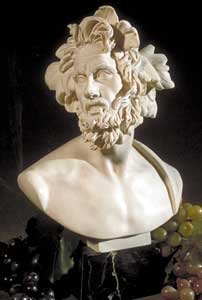Dionysus

Dionysus, the Greek god of wine and intoxication (also known by his Roman name Bacchus). He invented wine and spread the art of tending grapes. Dionysus has a dual nature, on the one hand bringing joy and divine ecstasy and on the other brutal, unthinking, rage. If he chooses Dionysus can drive a man mad thus reflecting both sides of wines nature. He was the sixth ruler of the ancient world. He came behind Chaos, Mother Rhea, Ouranos, Kronos and Zeus, his father. Dionysus was one of two children that Zeus had with mortal women, the other being Herakles. Dionysus is the son of Zeus (In Greek "Dionysos" means born from Deus( Zeus)) and the princes Semele. He is the only god to have a mortal parent (Herakles being a half-god). Zeus came to Semele in the night, invisible, felt only as a divine presence. Semele was pleased to be the lover of a god, even though she did not know which one. Word soon got around and Hera (Zeus' wife) quickly assumed who was responsible. Hera went to Semele in disguise and convinced her she should see her lover as he really was. When Zeus next came to her, she made him promise to grant her one wish and she went so far as to make him swear on the River Styx that he would grant her request. Zeus was madly in love and agreed she then asked him to show her his true form. Zeus, was unhappy, and knew what would happen but, having sworn he had no choice. He appeared in his true form and Semele was instantly burnt to a crisp by the sight of his glory. Zeus did manage to rescue the still unborn Dionysus and stitched him into his thigh to hold him until he was ready to be born. His birth from Zeus alone conferred immortality upon him.
Another story tells of Dionysus
being the son of Zeus and Persephone, Queen of the Underworld. Hera found
out about this and was extremely jealous and arranged for the Titans to kill
him. To distract the powerful child, they offered him a series of toys - knucklebones,
a little ball, a lump of wool, a jointed doll that bent at the knee, a bull-roarer,
a multi-colored spinning top, fair golden apples from the clear-voiced Hesperides,
some pomegranates in honey, and finally a mirror, which succeeded in capturing
the child's attention. Then they ripped him to shreds eating everything but
Dionysis' heart, which was saved by Rhea. Zeus then recreates his son from
this heart and implants him in Semele who bears a new Dionysus. Hence, as
in the earlier account, Dionysus is called "twice born.". After
this Zeus arranged for his protection and turned him over to the mountain
nymphs to be raised.
Dionysus wandered the world
actively encouraging his cult he was accompanied by the Maenads, wild women,
flush with wine, shoulders draped with a fawn skin, carrying rods tipped with
pine cones (a thyrsos). While other gods
had temples the followers of Dionysus worshipped him in the woods (Scholars
have long suspected that the god known as Dionysus is in fact a fusion of
a local Greek nature god, and another more potent god imported rather late
in Greek prehistory). In the woods they might go into mad states of mind where
they would rip apart and eat raw any animal they came upon. Dionysus is also
one of the very few that was able to bring a dead person out of the underworld.
Even though he had never seen Semele he was concerned for her. Eventually
he journeyed into the underworld to find her, he faced down Thanatos and brought
her back to Mount Olympus where she was made immortal by Zeus. Dionysus became
one of the most important gods in everyday life, associated with several key
concepts. One was rebirth after death, here his dismemberment by the Titans
and return to life is symbolically echoed in tending vines, where the vines
must be pruned back sharply, and then become dormant in winter for them to
bear fruit. The other is the idea that under the influence of wine, one could
feel possessed by a greater and divine power. The festival for Dionysus
is in the spring when the leaves begin to reappear on the vines. It became
one of the most important events of the year. It's focus became the theater
and most of the great Greek plays were initially written to be performed at
the feast of Dionysus.